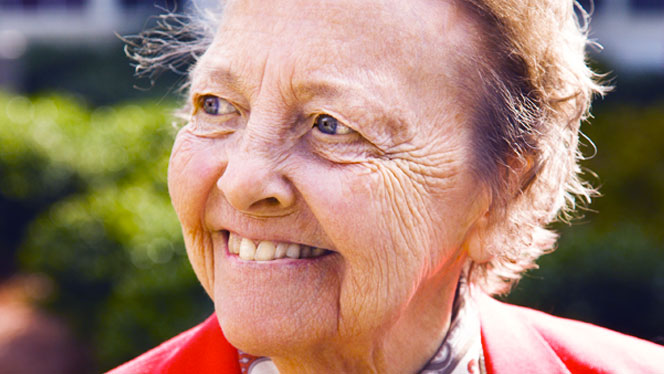Ageing parents – who cares?

The number of people aged 85 and over in the UK has shot up in recent years and it’s predicted to double in the next two decades. As they get older, people often need more care and support. But social services are struggling, communities are less cohesive than they used to be and families are often scattered. So whose responsibility is it to care for the elderly?
A woman’s work is never done….
Age UK reports that 1 in 4 women aged 50-64 and 1 in 6 men are now providing care for ageing parents. The number of women in this position has risen by 13% in the last 10 years.
Having this responsibility or full-time caring role can be satisfying and enable adult children to feel like they’re ‘giving back’ to parents who looked after them when they were small. But all too often it’s demanding and stressful – especially when the older person has memory and mobility problems.
Carers suffer from high rates of anxiety, depression and heart disease. They may be at the peak of their careers or key wage earners but have to go part-time or give up work altogether. And despite the fact that this is essential work, it’s often ‘hidden’ or under-valued, so that on top of everything else, carers feel unappreciated and suffer from low self-esteem.
But why is it so often women who take on the responsibility? Whilst both men and women struggle with the challenges of being a carer somehow women often slip into this role almost without questioning it. And then, no matter how hard it gets, they struggle to change the status quo.
Assumptions about who does what
When I ask my female clients how this happened they often talk about the assumptions made by society, by family members, even by themselves. For example,
- women look after children so they must be best suited to looking after the elderly too
- women who don’t have children have more time to support ageing parents
- women who are self- employed or work from home can easily take care of all their parents’ needs, especially if they live locally
- women are more patient, good at multi tasking, better at coping
- women have always quietly got on with domestic tasks without anyone realising how much they do
And yet women now in the 50-64 age bracket grew up with the idea of equality and ‘having it all’. Today it’s no longer unusual for men to share the ‘bread-winner’ role, child-care, and household chores. But somehow when it comes to eldercare it seems like we’re back in the 1950s.
What about male carers?
Of course there are some fantastic male carers out there who handle the domestic chores and personal care for elderly relatives as well as all those complex financial and legal tasks that their relatives can no longer manage.
Male carers often have a more challenging time of it than female carers as they tend to have fewer support networks to help them cope. They may also find it more difficult to ask employers for flexible working hours and, if they give up their careers, harder to establish a new identity outside of the workplace. Men also seem to find it harder to ask for help, seek support and talk about uncomfortable feelings they may be experiencing.
Coping with the Responsibility
Whilst accepting that eldercare is nearly always difficult, what’s the best way for you to avoid feeling completely overwhelmed if you’ve shouldered the responsibility?
- Don’t panic. Accept that you can’t do everything yourself and shouldn’t have to
- Get help. Despite the changes in society, there are others who can help – family, friends, neighbours, charities, religious organisations, social services, professionals, paid carers – the list goes on
- Be assertive. Tell people what needs doing. If possible, ask them to do the things they are good at and try to share out the jobs that no-one wants
- Challenge assumptions. Don’t take on responsibility just because you always have, because you’re female (or male), because you’re the oldest, the youngest etc
- Open up. Talk about how you’re feeling, don’t bottle up resentment and worries. Saying things ‘out loud’ to a third party can be a relief and can help you to ‘see the wood for the trees’
Are you struggling to cope with responsibility for ageing parents? Why not try a FREE taster support session (worth up to £85) to talk things through. Just drop me an email mentioning ‘When they get Older’ and include a brief outline of your situation. I’ll be glad to help.
Dr Lesley Trenner is a life coach who specialises in supporting people with ‘ageing parent’ issues. She has 12 years experience helping individuals and organisations going through change. For more information visit Lesley’s website, send her an email or call 07919 880150.
If you found this article helpful, why not join the family?

Hi. Just found out my mum has mixed dementia on the 4th September. I struggle with depression and anxiety quite bad anyway and since I found out about my mums dementia she also got septic and the. Pneumonia. She’s on the mend from the pneumonia now but is still having terrible headaches. I’m thinking this is the dementia declining. Although she insist not. I have 3 brothers and I M the youngest only girl. My mums sons don’t bother to visit her and haven’t for years. I feel so alone. I have my daughter living here but she’s no support… Read more »
Our life coach and eldercare adviser Dr Lesley Trenner has been in touch and offered support. Her response can be found in our “agony aunt” column.https://whentheygetolder.co.uk/family/ask-lesley/how-can-i-care-for-mum-with-dementia-when-i-cant-cope-myself/ If you have an emotional or family challenge with caring, get in touch and Lesley will help if she can.